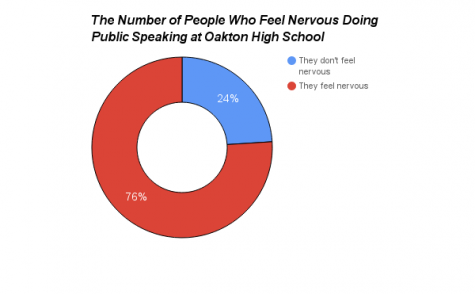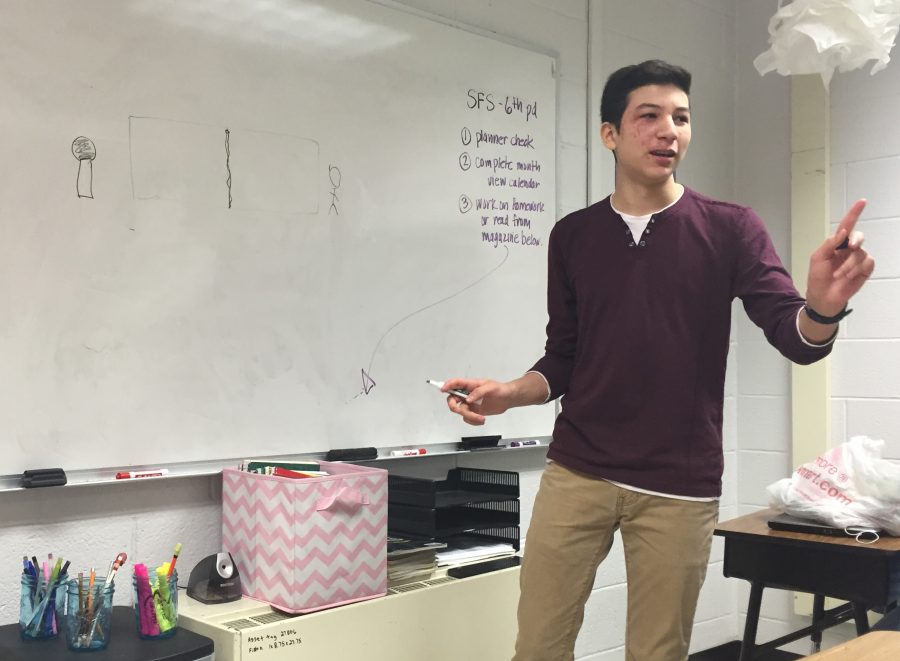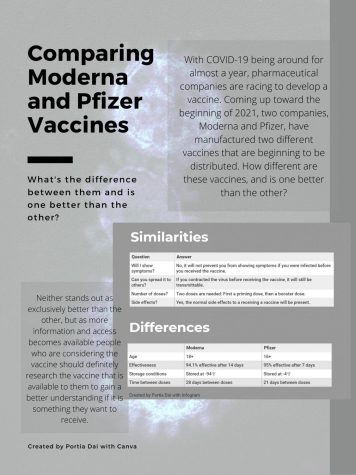Public Speaking for Oakton High School Students
Students typically do not reflect public speaking well; however, it is something that most students will have to endure during their educational career between presentations and speeches. The Oakton Outlook conducted a study to find out the forms, difficulties, benefits, ways to improve and the number of people who feel nervous doing public speaking at Oakton High School.
For the typical high school student, the idea of public speaking has rarely had a positive response. Moans are typically associated with the reaction of having to do some form of public speaking when told to by a teacher or even in certain situations outside of class. Today, being an effective public speaker can go a long way. Public speaking has the ability to inform many people about your particular information and many companies may look favorably into this so the ability to be a strong public speaker opens up many options. Explore the different aspects of public speaking according to varying students, such as some difficulties, benefits, ways to improve or forms of public speaking done at Oakton High School.

OHS Outlook study according to 100 Oakton High School Students.
For freshman Brendan Bellingham, public speaking occurs in intervals of about once a month during presentations for a school project. Bellingham believes that it is so difficult because “you’re talking in front of people your age and people that you know and want to feel acceptance from”. The social pressure greatly impacts him and he tries to avoid embarrassing himself since he has the attention from the audience. The benefit he sees that comes from having to do public speaking and encounter this anxiety is that it pushes himself out of his comfort zone, something he said he felt very nervous about. Prior and during any form of public speaking, Bellingham feels extremely anxious and his way of expressing this is by “rubbing the sideburn part of his hair” like a nervous tic. With limited years of public speaking, especially compared to older students, it has not become an easier activity for him to do over time, the pressure still lies on him. The best way Bellingham suggested to improve speaking in public is practice, practice, practice. Eventually, it will have been practiced or done so much to the point you will no longer need to use your script and will be able to infuse passion and emotion into your presentation.
Public speaking for David Joya, a sophomore at Oakton High School, is most often done in school whether it’s for projects or speeches for club position elections. Joya also stated that there is no consistent basis in which public speaking is done for him such as on a weekly basis, but is done “whenever needed for a grade”. According to Joya, some of the benefits of public speaking include “becoming more confident in your ideas and it becomes easier to convey your ideas to people”. He further went on to say some of the difficulties of public speaking he faces are the amount of pressure felt when all eyes are focused on you and how they are taking every single word you say into account which becomes even more overwhelming if “it gets to you as you are speaking”. Luckily for Joya, he musters up the confidence to “put on a mask” and fake his confidence in order to show no signs of nervousness; anxiety to the people he is speaking. Like many other things, “practice makes perfect” and the same applies to Joya. He finds that doing it over and over again can allow you to get used to speaking . He expanded on ways to improve and also said “pretending to be the most confident person in the world may help others with their issues”. Portraying confidence is often an effective method in showing your viewer you are confident about yourself and the material you are talking about which normally is something you would always like to achieve.
Sarah Thompson, a junior at Oakton High School, is a frequent public speaker, predominantly in class. She often times leads activities in class and does public speaking in some form at least once a week. Thompson found many benefits to public speaking. As opposed to many, she actually finds that it relaxes her. She feels more comfortable speaking in front of a larger crowd instead of a smaller one as it allows her to be more confident in her abilities, something not many people can say on the topic of public speaking. While she does feel comfortable speaking, the fear of messing up still lies beneath, especially when the presentation may be for a big grade in a class. She even provided an example saying that just recently, she had to face this fear of failure but realized that everyone is bound to make mistakes. Like many, she faces the habit of twiddling her thumbs while speaking and is looking to break this habit similar to how others may try to make their habits of things like mumbling, stuttering or shifting in place while speaking. Thompson pointed out three effective methods to improve in public speaking. The first way is to practice your presentation with a group of people you trust in order to receive constructive criticism. The second way is to take deep breath before beginning. The third and final way is to be confident in what you’re talking about and “always smile”.
For Nick Sims, a senior at Oakton High School, public speaking is rarely an occurrence for him in class although he has adopted a leadership role on the football team. Because of this, he has become more confident when speaking in front of a group of people, however, this confidence only goes so far and as an introvert, Sims occasionally “gets nervous and tends to mumble”. As a senior, Sims has had plenty of experience doing public speaking compared to the majority of Oakton High School and has found that this level of experience of public speaking has led to it becoming easier over the years. This seems to be a continuation of the theme of “practice makes perfect”. His most notable tip on improving for your next presentation at school or speech outside of class is to practice and prepare the content you will speak about. This way you will not have to rely on your notes or script. Audiences will recognize this and be more willing to listen to you speak as you speak more spontaneously.







